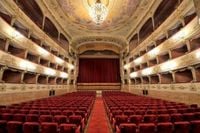The Teatro della Pergola in Florence has successfully avoided a downgrade, but the government has issued a low score for its artistic direction. The Teatro della Toscana, which includes the Pergola, is set to benefit from its national theater status and a funding contribution of 2 million euros for 2025.
On May 8, 2025, a ministerial commission in Rome confirmed that the Teatro della Toscana will remain in the first band, averting fears of a downgrade. This decision comes amid ongoing battles between the city council and the Ministry of Culture regarding the theater's future. Despite the confirmation of national theater status, the artistic direction led by Stefano Massini received a score that raised eyebrows.
Massini, who has been at the helm since January 2025, has faced scrutiny regarding his leadership. The commission had previously requested additional information about the management and programming of the Teatro Rifredi, which joined the foundation in 2022 and experienced delays in its season start. The situation became more complex following the unexpected departure of Marco Giorgetti, the foundation's general director, who was let go by Palazzo Vecchio.
The artistic direction under Massini has been a focal point of criticism, with suggestions that his profile and political views may not align with the current government's expectations. The commission's low score for Massini's leadership was perplexing, especially given the high levels of support he has received from various artists and intellectuals.
Notable figures in the arts community, including Dacia Maraini, Antonio Scurati, Michele Serra, Toni Servillo, Antonello Venditti, Alessandro Gassman, and Fiorella Mannoia, have rallied behind Massini. They signed an open letter condemning what they describe as a "concrete threat" from the right-wing government to penalize the Teatro della Toscana for its artistic direction under Massini. The letter emphasizes that this represents a political attack that should not interfere with theater and culture.
In a statement to Collettiva, Massini expressed his dismay at the rumors regarding potential resource cuts from the government. He stated, "I am quite astonished and deeply saddened by the rumors that are circulating, which I hoped were not true. The harsh penalization of the commission’s quality judgment towards me is honestly disrespectful to the enormous work I have done over many years, especially abroad, promoting Italian-language theater that is often unknown. The only positive note in this ugly story is the strong support from people who have motivated me against an attack that I truly do not believe I deserve."
Massini's leadership aims to make culture more accessible, focusing on productions that resonate with a wider audience. However, the current political climate has cast a shadow over his efforts. The commission’s doubts about the artistic programming, particularly concerning the Teatro Rifredi, have led to calls for further investigations into its operations.
As the commission deliberates, the stakes are high for the Teatro della Toscana. The foundation needs to maintain its first-band status to secure the vital funding from the Ministry of Culture, which is crucial for its operations. The commission's concerns about the artistic programming and the management of the Teatro Rifredi have raised questions about the sustainability of Massini's vision.
In recent months, the foundation has faced significant challenges, with the artistic direction under scrutiny. The low score attributed to Massini's leadership has sparked debates about the future of the theater, with many questioning whether his innovative approach can survive in a politically charged environment.
Despite the challenges, the solidarity expressed by the cultural community highlights the importance of creative autonomy within Italian cultural institutions. The letter from prominent artists serves as a reminder of the need to protect artistic expression from political interference.
As the situation unfolds, the Teatro della Toscana stands at a crossroads. While it has successfully averted the loss of its national theater status and secured funding for the upcoming year, the ongoing tensions surrounding its artistic direction could have lasting implications for its future.
In conclusion, the fate of the Teatro della Toscana reflects broader struggles within the cultural landscape of Italy, where politics and art intersect. The outcome of this situation will likely shape not only the future of the theater but also the relationship between the government and the arts community.





